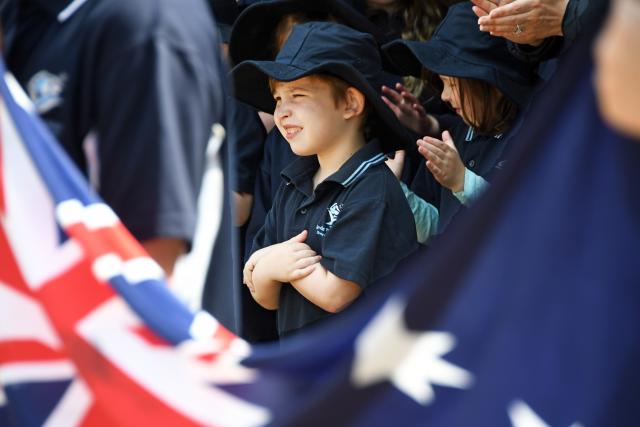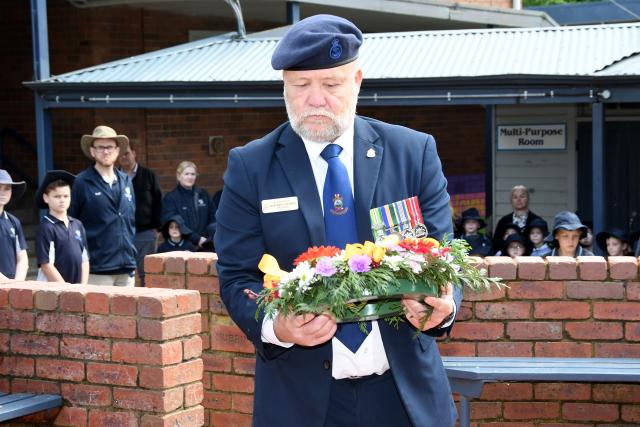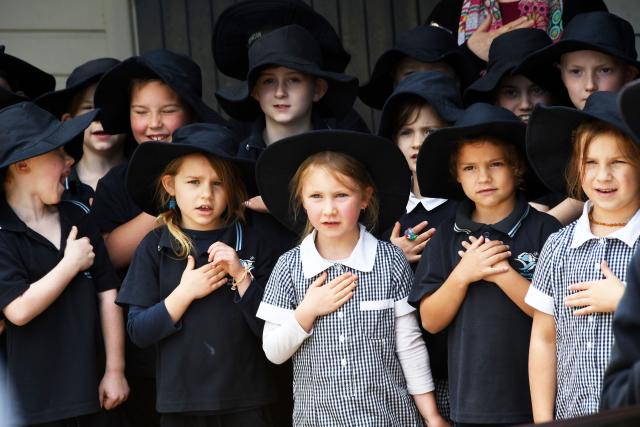
By Callum Ludwig
Seville’s most honoured war hero was honoured on the anniversary of his bravest feat on Thursday 5 October, despite the recent vandalism of the Seville War Memorial.
The service for Captain George Ingram VC was relocated to the Seville Primary School’s memorial with all of the school’s students in attendance, listening intently and respectfully.
Chair of the Seville War Memorial Committee Anthony McAleer OAM opened the service and told students that were there to remember someone who settled in their township and did some very brave things.
“On this very day, exactly 105 years ago, the last battle of the war that involved soldiers from Australia happened in a village called Montbrehain in France and involved in this battle on this day was George Ingram from Seville who, like all of you, was a student at this school when he was a boy,” he said.
“George was to do some very great things in this battle, the village of Montbrehain had been invaded earlier by enemy soldiers, and it was the Australian soldiers’ job to rescue the poor villagers and to take back the village from the enemy.”
George Ingram was the 64th and last Australian to receive the Victoria Cross during World War One and also received a Military Medal for his acts of gallantry.
Sergeant Brendon de Schwartz from Lilydale Police said George Ingram was also a member of Victoria Police and became Victoria Police’s most decorated member.
“George became a soldier in his spare time, learning how to fire huge cannons of the big forts of Queenscliff and Point Nepean. When the First World War began, he decided to become a soldier full-time and was sent to a tropical island in the Pacific called Rebaul, where he was given the job of looking after the big cannons that guarded the harbour there,” he said.
“He was there for about a year when he became very sick with a tropical disease called malaria. He was so sick that he sent him back to Australia and told him he could not be a soldier anymore.”
Disappointed that he couldn’t be fighting in the war, especially as his younger brothers Alex and Ronald had gone off to fight, George Ingram changed his middle name, didn’t tell authorities that he had been ill and was sent to the Western Front.
Sgt de Schwartz said the war was a very sad time for George.
“He lost some very good friends who died fighting in the army and worst of all, both of his younger brothers were killed fighting in some of the horrible battles as well,” he said.
“Soon after the war ended, George returned home to his parents in Seville and the people of Seville were so proud of George that they gave him a special welcome home card at the public hall,”
“After the war, he joined the Shrine Guard, who are a special group of the Victoria Police force who look after the Shrine of Remembrance.”
Sadly, George Ingram’s panel at the Seville War Memorial was one of two that was irreparably damaged by the recent vandalism incident.
Mr McAleer OAM told students about the day that earned George Ingram his Victoria Cross, where he and the other soldiers charged up the road towards the village while the enemy sheltered from bombs.
George Ingram and the other Australian soldiers overcame multiple enemy posts in their attack, sheltering behind an advancing tank at one point to progress further and then once again proceeding to reclaim the village.
George Ingram is believed to have killed at least 40 enemy soldiers in this encounter, while accounting for many more as others surrendered or were captured, including a house containing 30 soldiers which he captured himself.
Piper Iain Townsley and Bugler Tom Steele attended to play for the service and President of the Mt Evelyn RSL Matthew Crymble gave the Ode to the Fallen.
Sgt De Schwartz, assisted by Seville Primary School Captains Blake, Lily and Connor, and Mr Crymble each laid wreaths at the plaques to George Ingram at the entrance of the school.










